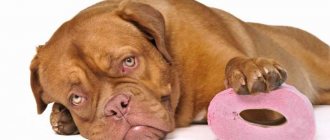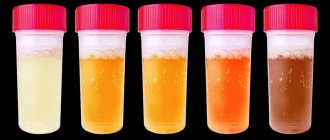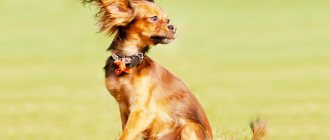Mucous bloody diarrhea in animals
Diarrhea (diarrhea) is a clinical problem, which is often characterized by the release of liquid, pasty, watery stool . Depending on the root cause, the stool may contain foam, mucus, undigested food residues, and bloody substances (clots, threads, inclusions).
Diarrhea in animals can be acute , which goes away without any noticeable symptoms, and chronic , which lasts more than two weeks.
If your puppy or dog is diarrhea, it is very important to determine the root cause that caused the stomach upset. Prolonged diarrhea can cause dehydration (dehydration), exhaustion, and electrolyte imbalance in the body.
Important! Prolonged diarrhea is dangerous for small puppies, pregnant and lactating bitches.
In most cases, the nature, color, and consistency of feces can determine the cause of diarrhea in animals.
Black, loose stools with mucus in dogs and other pets indicate the presence of digested blood. The stool appears to have a tar-like consistency. A similar phenomenon occurs due to bleeding in the upper gastrointestinal tract.
bright scarlet blood are noticeable in your pet's stool , this is a symptom of bleeding in the large intestine. The blood is not affected by enzymes and is excreted unchanged in the stool.
If the stool has a normal color, but also contains mucus, foam, and blood , such diarrhea most often occurs due to acute inflammation in the digestive tract.
Bloody diarrhea in dogs and vomiting: Causes
The appearance of blood in vomit and feces indicates damage to the blood vessels in the animal’s digestive tract and the occurrence of bleeding of varying degrees of intensity.
By the color of the blood, you can determine in which part of the digestive canal the damage occurred:
- if an animal vomits coffee grounds, this indicates gastric or duodenal bleeding;
- if the stool is black, this is a sign of bleeding in the small intestine;
- if fresh scarlet blood is mixed with them, the large intestine is damaged.
The reasons may be the following:
- Mechanical damage from a bone fragment, stick, paper clip, etc.
- Helminthic infestation (in particular with toxocariasis).
- Infectious diseases (parvovirus, coronavirus enteritis of carnivores, viral hepatitis, plague of carnivores).
- Poisoning with household pesticides and medications.
- Tumor processes.
Note to dog owners! Online consultations with a veterinarian in Yandex: Verified specialists, professional care. Chat with a doctor. Express help. Quick solutions. They work all day. Read all the information here .
I especially want to focus on helminthic infestations and infectious diseases. These pathologies are most dangerous for puppies and can lead to death.
Viral enteritis has clear symptoms: lethargy, loss of appetite, diarrhea and vomiting with blood, increased body temperature. If the animal is not provided with timely assistance, it will die from dehydration and impaired cardiac and respiratory activity.
Toxocariasis rarely causes intestinal bleeding, but this is a dangerous sign: rupture of the intestinal wall by toxocara tangles is possible.
Additionally, puppies will have the following symptoms: loss of appetite, enlarged abdomen, lethargy, dermatitis, baldness, and the appearance of parasites in feces and vomit.
Causes of bloody diarrhea with mucus
The presence of blood, bloody clots, inclusions in the dog’s feces, profuse bloody diarrhea is a characteristic symptom of many serious, life-threatening diseases for the pet. In this case, first of all, you need to determine where exactly the bleeding site is located.
Causes of bloody diarrhea with mucus in dogs:
- hemorrhagic, parvovirus, coronavirus gastroenteritis;
- parasitic, protozoal diseases;
- helminthic infestation;
- acute viral infections, bacterial diseases;
- the presence of foreign bodies in the gastrointestinal tract;
- food poisoning;
- inflammatory processes in the gastrointestinal tract;
- intussusception of the intestinal walls;
- neoplasms, tumors in the intestines;
- chronic pathologies of the liver, pancreas (pancreatitis);
- traumatic enterocolitis;
- severe injuries, peritoneal damage.
Acute bloody diarrhea with mucus is often observed in small puppies and young, unvaccinated dogs. A similar phenomenon in combination with other symptoms (vomiting, fever) indicates the development of viral-bacterial and parasitic diseases. With canine distemper, leptospirosis, adenoviral hepatitis, viral enteritis, colibacillosis, staphylococcosis, sarcopticosis, blood and mucus are always present in the feces of animals.
Bacteria that cause salmonellosis and leptospirosis damage blood vessels and affect the mucous membranes of the digestive tract. Erosive foci, small bleeding ulcers, and ulcers appear on the walls of the intestines and stomach. Acute inflammation develops in various parts of the gastrointestinal tract.
Important! Mucous, bloody, acute diarrhea in animals is a characteristic symptom of the atypical form of rabies.
Bloody, foul-smelling diarrhea with mucus is noted if the dog is infected with worms, namely nematodes, liver fluke . Endoparasites feed on beneficial substances that enter the host’s body with food, disrupting metabolism and digestion. Localized in the intestines, liver, and other internal organs, helminths cause degenerative and destructive changes in tissues, damage mucous membranes, and provoke inflammation in the organs of the digestive system.
If there is a large amount of mucus in the pet’s stool, bloody substances are noticeable, very often this phenomenon develops against the background of hemorrhagic gastroenteritis . In addition to diarrhea, dogs suffer from debilitating vomiting and severe thirst. In sick animals, the temperature rises sharply, activity decreases, and there is no appetite.
Other causes of bloody mucous diarrhea in dogs include: feeding with low-quality prepared food, raw meat products of dubious origin, poisoning with potent chemicals, poisons, and medications. Vomiting, mucous, bloody diarrhea often occurs due to intestinal obstruction, the presence of foreign objects in the lumen of the colon that injure the walls.
If there is mucus, bloody clots, or inclusions in the stool, the cause is often due to dysbacteriosis. The disease can develop due to long-term use of medications after antibiotic therapy.
Diarrhea of parasitic origin
Alas, a puppy may already be born with worms in the intestines, since many types of parasites are capable of intrauterine infection. In addition, infection is often a consequence of feeding on the milk of a mother who herself suffers from severe parasitic infestations. Veterinary practice shows that most often bloody diarrhea is caused by hookworms and whipworms (as well as other types of parasitic nematodes), cestodes (flat types of parasitic worms).
Almost all types of helminthic infestations can be easily eliminated if treatment is prescribed in a timely manner.
In case of parasitic infestations, be sure to provide your pet with a sufficient amount of clean drinking water . Please note that during treatment the puppy will likely experience extreme thirst. This is explained by the fact that his body seeks to remove as many toxins as possible.
But helminths, even though they are very common, are not the most dangerous types of parasites. In addition, they do not cause bloody diarrhea as often. Diarrhea mixed with blood is much more typical in cases of protozoal infections. The most common species are Giardia and Coccidia.
Protozoal infections
As a rule, protozoal infections are characterized by the appearance of large quantities of watery stool with mucus and copious amounts of bloody clots. In addition, all “protozoans” are characterized by a gradual loss of strength and progressive exhaustion, as well as a deterioration in the condition of the skin and coat. If you suspect your puppy is suffering from giardiasis or coccidiosis, take him to the vet immediately. Alas, treatment of advanced cases of protozoal pathologies is dangerous not only for parasites, but also for the pet itself: the drugs used are quite toxic and can cause a lot of harm to your pet’s body.
If you identify the disease in the early stages, it will be much easier to cure your pet using fewer medications. As with worm infestations, it is important to provide your puppy with sufficient amounts of clean drinking water. Please note that protozoonoses are highly transmitted to other domestic animals, as well as to people. In order not to “catch” giardiasis, you need to strictly observe personal hygiene measures.
Treatment methods
Therapeutic therapy is primarily aimed at eliminating the root cause and normalizing the general condition of the animal.
If a dog is diarrhea due to severe poisoning, detoxification therapy, sorbents, probiotics, and enzyme agents to normalize digestive processes (Enterosgel, Lactobifadol, Festal) will be prescribed. To relieve intestinal spasms, no-shpa or its analogues are prescribed.
Important! In case of bloody mucous diarrhea, the animals are given IVs, which are necessary to restore the water-salt balance in the body.
For diarrhea with mucus and blood, gastroprotectors and medications that improve blood clotting are also prescribed - Vikasol, Etamzilate, calcium gluconate, Dicinone. Phthalazole, furazolidone, loperamide, enterofuril will help eliminate bloody mucous diarrhea. The veterinarian will select the drug and dosage.
To relieve inflammation in the gastrointestinal tract, in addition to pharmaceutical medications, you can give your dog decoctions of medicinal plants. Chamomile, oak bark, St. John's wort, and blueberries help well. Decoctions based on medicinal plants have an anti-inflammatory, astringent effect.
If mucous, bloody diarrhea is caused by any disease, treatment involves complex, symptomatic therapy. Four-fingered patients are prescribed antiparasitic, antibacterial, sulfonamide drugs, complex systemic antibiotics of the penicillin, tetracycline, and cephalosporin series.
If mucous bloody diarrhea is provoked by helminthic infestation, animals are treated with anthelmintic drugs. The choice of drug depends on what type of endoparasites the dog is infected with. Animals are prescribed complex anthelmintics.
For tumors, intussusceptions, and ruptures of the intestinal walls, surgical intervention is performed.
Feeding dogs with diarrhea
a starvation diet for 12-24 hours . It is mandatory to adjust the diet, prescribe a therapeutic diet or special food if the pet is kept on a ready-made diet.
Food in the first weeks, if bloody mucous diarrhea is caused by poisoning, should be nutritious and easily digestible. Give your pet low-fat cottage cheese, skim milk, and natural yoghurt in small quantities.
Offer your dog a small portion of rice cooked in chicken or beef broth. Divide the daily food intake into several meals. Feed your pet in small portions, 4-5 times a day. There should always be fresh drinking water in the bowl. As soon as the stool and the general condition of the dog are normalized, you can transfer the animal to its usual type and feeding mode.
Follow strictly all the recommendations of your veterinarian, carefully monitor your pet’s health and behavior. If the condition worsens, contact your veterinarian.
The Yorkshire Terrier requires special attention. This dog breed has an excellent appetite. Caring owners often pamper their pet with sweets. But the puppy’s digestive system does not always cope with such food. Diarrhea in your Yorkie can lead to rapid dehydration.
Prevention
To exclude diarrhea of various etiologies, you should pay close attention to the health of your Yorkie. And for prevention, you should adhere to the following recommendations:
- feed the dog correctly, based on the advice of a veterinarian;
- promptly treat pathologies of the digestive tract, liver diseases and others;
- Treat your pet with antihelminthic drugs 4 times a year;
- administer the vaccine in a timely manner;
- undergo routine examinations by a veterinarian at least 2 times a year.
Diarrhea in Yorkies is often associated with overeating or a change in diet; less often, it can indicate parasites and infections in the digestive tract. You can differentiate the problem yourself by the color and nature of the stool. To treat diarrhea in Yorkies, rehydration solutions, sorbents, probiotics, anthelmintic and antibacterial drugs are used. During treatment, it is important to adhere to a gentle diet.
Many owners overfeed Yorkshire terriers, pampering them with treats from their table. But the terrier has a very delicate digestive system, and due to poor nutrition, diarrhea and vomiting may occur. This is dangerous for the animal, because without treatment, dehydration begins.
In this case, you can help the dog by taking the advice of dog handlers and veterinarians.
Causes of diarrhea in Yorkies
Digestive disorders in dogs can occur for various reasons:
- The Yorkshire Terrier should not be constantly fed fatty, salty or too sweet foods. Such food can lead to severe poisoning. Keep an eye on expiration dates on canned dog food. Expired food should be thrown away.
- Infection with worms leads to intestinal blockage. Parasites cause nausea in dogs. The mucous membranes of a sick animal become inflamed, and diarrhea occurs. In this way, the body tries to get rid of parasites that are actively reproducing in the intestines.
- Yorkies are considered indoor dogs that tend to be overweight. Do not overfeed your pet. Although many pet owners do not think about what they feed their dog. Regular overeating leads not only to obesity, but also to diarrhea. In some dogs, this disease is accompanied by bouts of vomiting.
- Diarrhea in a Yorkie can occur due to dysbiosis. The cause of microflora disturbance may be poor-quality food. While walking, your pet may accidentally eat spoiled food.
- Diarrhea is often caused by an allergic reaction to certain components of the feed. It may contain various food additives that are not suitable for dogs.
- The digestive organs of puppies instantly respond to a change in food. New food should be introduced into the diet gradually so that the pet’s body has time to adapt to unfamiliar ingredients.
Prevention
It is difficult to completely exclude the possibility of developing diarrhea, because a Yorkie can develop loose stools even from a stressful situation. But every owner is obliged to minimize digestive disorders in their four-legged pet. It is enough to be attentive to your pet: feed only fresh and high-quality food, make sure that the animal does not pick up anything on the street, carry out vaccinations and deworming in a timely manner.
The health of a small lap dog is entirely in the hands of its owner. When purchasing such a dog, a person must be prepared for special care for it. Whether the Yorkie will be healthy and happy depends only on its owner.
The Yorkshire Terrier is a very gentle dog, and therefore requires increased attention and special care. The excellent appetite of these dogs often leads to disorders of the digestive tract and can lead to dehydration of the small body. Diarrhea in a Yorkie requires immediate treatment to help prevent exhaustion and death of the pet.
Symptoms
You can determine that a Yorkshire Terrier has diarrhea based on several signs:
- Your pet's bowel movements become more frequent.
- The stool becomes liquid and mucous discharge appears.
- The puppy suffers from chills and becomes lethargic.
- The disease leads to loss of appetite. The puppy refuses to go to the food bowl.
- The dog suffers from constant bouts of vomiting.
- Diarrhea in a Yorkie puppy leads to rapid weight loss.
- A sick pet suffers from dehydration.
- Pay attention to the color of the stool. Black stools may indicate the development of internal bleeding.
- Discharge from the eyes and cough are a symptom of the plague. Only urgent hospitalization can save a sick animal.
Green diarrhea
Green diarrhea with an unpleasant sour smell indicates that the puppy accidentally ate rotten food. After eating low-quality food, the body of a sick animal begins to produce toxins. This harms your pet's liver and kidneys.
Diarrhea with blood in a Yorkie: causes, symptoms and treatment of diarrhea
Digestive disorders in small dogs are quite common, but when a Yorkie has diarrhea with blood, this is a very dangerous symptom that requires the help of a veterinarian.
Yorkshire Terriers are lap dogs with a sensitive digestive tract and a weak liver. A pet's stool disorder may indicate an error in the dog's diet, poisoning, or infectious diseases.
Due to the fact that the Yorkie has a relatively small body weight, frequent diarrhea can lead to rapid dehydration and death of the four-legged friend.
Liquid stool (diarrhea) is not considered a dangerous condition if it lasts no more than 3-5 days. However, the dog owner should take a close look at his pet's stool.
The feces of your four-legged friend may contain mucus, undigested food particles, and blood.
It is very important to monitor the color of the stool, because an unnatural shade of feces indicates the presence of certain disorders:
- pale stool is a sign of liver pathologies;
- black color of feces - the dog has internal bleeding;
- green tint of excrement - possible presence of infectious diseases, food poisoning;
- Blood in a Yorkie's stool is a sign of dangerous infectious diseases, injuries, helminthiasis, and volvulus.
Causes of bloody diarrhea in Yorkies
Bloody feces in a Yorkie are considered a sign of an inflammatory process. The most common causes of bloody diarrhea are:
- ulcerative lesions of the stomach;
- rabies;
- helminthiases;
- intestinal injuries;
- inflammation of the pancreas;
- intoxication with toxic substances or medications;
- dysbacteriosis;
- cancerous tumor in the intestine;
- carnivore plague;
- intestinal infections.
Symptoms of bloody diarrhea in a Yorkie
You can determine that your pet has bloody diarrhea by the following signs:
- The number of bowel movements increases to 3-4 times a day, sometimes the dog begins to empty its intestines about 10 times a day.
- The appetite completely disappears, the Yorkie does not even show interest in his favorite treats.
- Yorkie poops blood.
- The pet is shivering, and general weakness of the body is observed.
- Vomiting, discharge from the eyes and nose, and coughing may occur.
My Yorkie has diarrhea and vomiting, what should I do? If a Yorkshire Terrier also vomits during diarrhea, this will very quickly lead to dehydration and death of the pet. In such cases, your four-legged friend should be taken to the veterinarian immediately.
It should be noted that vomiting is the body’s protective reaction to an irritating factor (infectious disease, poisoning with poisons and chemicals, helminths). The owner of the animal must tell the doctor about the nature of the vomiting: how often the pet vomits, whether there is mucus, blood, or foam in the vomit.
If your puppy is simply vomiting, you will find this article helpful.
Diagnostics
What to do if your Yorkie has bloody diarrhea? A veterinarian can determine the cause of indigestion. To make a diagnosis, one clinical examination is not enough; it is necessary to carry out a whole range of measures:
- Blood test for biochemistry. Allows you to determine the presence of pathological processes in the kidneys and liver.
- Scatological analysis of stool. With its help, you can identify parasites that have settled in the dog’s intestines.
- X-ray. Able to assess the external state of internal organs (stomach, liver, intestines), allows you to see a foreign object in the digestive tract, an accumulation of liquid or gases.
- Blood test (general). Using the method, you can find out whether there is an inflammatory process in the animal’s body. Also, a blood test gives an idea of the iron content and the degree of dehydration of the dog.
- Cytology. Used to identify the simplest microorganisms that cause your Yorkie to stool in the blood.
Treatment for bloody diarrhea in Yorkies
Your Yorkie has loose stools, how to treat your pet? Before starting treatment for diarrhea, it is necessary to conduct an examination of the dog’s body and find out what caused the diarrhea.
If diarrhea is a consequence of a foreign object entering the digestive tract, the doctor prescribes wound-healing medications for the dog.
Depending on the severity and neglect of the process, surgical intervention is sometimes required.
What to give your Yorkie for diarrhea if diarrhea is a consequence of intoxication? If the cause of liquid feces with blood is poisoning, the animal is given gastric lavage and adsorbents are given (Rehydron, Smecta, activated carbon). In the case where the poisonous substance is known, the introduction of an antidote is required.
Infectious diseases require urgent medical intervention. For example, canine distemper can lead to death of a dog in a matter of days.
To treat bacterial and viral infections, antimicrobial and antiviral drugs are used, as well as agents that help restore and strengthen the immune system (immunomodulators, vitamin complexes).
Severely dehydrated and weakened animals are given a course of drips (intravenous administration of glucose, Ringer-Locke, sodium chloride).
Mucus in your Yorkie's stool indicates the presence of parasites . For helminthiasis, antiparasitic drugs are used, the dosage of which should only be prescribed by a veterinarian. If diarrhea is accompanied by frequent vomiting, antiemetics are used.
They start feeding the dog only after the puppy gets a little stronger. If the pet does not eat on its own, food (in liquid form) is administered through a special tube. During the recovery period after an illness, the dog is put on a diet that includes the following products:
- lean meat or fish;
- cottage cheese, fermented milk products;
- porridge (rice, oatmeal);
- boiled vegetables;
- offal (boiled liver);
- hard-boiled eggs.
Prevention
It is difficult to completely exclude the possibility of developing diarrhea, because a Yorkie can develop loose stools even from a stressful situation.
But every owner is obliged to minimize digestive disorders in their four-legged pet.
It is enough to be attentive to your pet: feed only fresh and high-quality food, make sure that the animal does not pick up anything on the street, carry out vaccinations and deworming in a timely manner.
The health of a small lap dog is entirely in the hands of its owner. When purchasing such a dog, a person must be prepared for special care for it. Whether the Yorkie will be healthy and happy depends only on its owner.
Causes
What can cause diarrhea in a Yorkie? Most often, diarrhea is caused by nutritional disorders:
- Wrong diet. These small dogs love to eat and are often omnivores. However, the menu should not include salty, sweet and fried foods. Such food can cause serious poisoning in the animal.
- Poor quality food. When purchasing canned dog food, you need to pay attention to the expiration date of the product. You should also not give your pet cheap dry food of low quality.
- A sudden change in diet. New foods can cause diarrhea in your dog. Yorkies are very sensitive to the composition of their food. Therefore, new foods should be given to them in small quantities, gradually expanding the diet.
- Overeating. The Yorkshire Terrier is a small indoor dog breed. Such animals lead a rather passive lifestyle. Systematic overfeeding can lead to excessive obesity, as well as diarrhea and vomiting in a Yorkie.
In addition, diarrhea may be a sign of the following pathologies:
- Helminthic infestations. Parasites cause inflammation of the gastrointestinal mucosa. In animals this is accompanied by severe diarrhea. In this way, the body tries to get rid of helminths.
- Allergic reactions. Your Yorkie's diarrhea may be due to food allergies. The body of these dogs is quite sensitive to the composition of the food.
- Infectious diseases. Diarrhea is one of the symptoms of viral diseases.
- Non-food poisoning. Sometimes stool disorders in dogs occur after inhaling chemical vapors. In addition, small puppies can swallow inedible objects.
- Acute pancreatitis. Inflammation of the pancreas is usually observed in overweight dogs who are prone to overeating.
It is important to remember that the gastrointestinal tract is a weak point in Yorkshire Terriers. Therefore, it is necessary to monitor your pet’s diet and give your puppy vaccinations on time.
What to do, how to treat diarrhea in a Yorkie, causes of diarrhea in a Yorkie dog
Yorkshire Terrier dogs are considered to be quite demanding in terms of nutrition and attention. Yorkies do not like to be alone and are sociable.
They need to be combed daily, and it is recommended to cut them at least once every 3 months. You need to take very careful care of your pet's ears and teeth.
To prevent tartar, Yorkshire Terriers are given chewable tablets, rubber/silicone toys, and also have their teeth brushed.
The digestive system of these dogs is quite sensitive. They can be fed dry food and canned food. It is also recommended to give fish, vegetables, fruits, boiled meat, and cereals from various cereals. It is forbidden to give fatty foods. When feeding, you need to take into account the dog's weight. At one meal, she should not eat more than 1 tablespoon per 500g of weight.
General symptoms
Diarrhea in a Yorkie can be a manifestation of various diseases and conditions. Each pathology is accompanied by its own characteristic symptoms. However, there are common signs of diarrhea in this breed of dog:
- frequent and loose stools;
- the presence of mucous impurities in feces;
- refusal to eat;
- extreme thirst due to dehydration;
- vomit;
- lethargy, apathy;
- chills;
- weight loss
Dysbacteriosis
This is the name for a disorder in the microflora of the stomach or intestines. Adverse factors can affect the amount of natural microflora in a dog's stomach. It either decreases or disappears altogether. The empty “niche” is occupied by another microflora that does not suit the animal’s stomach. The reasons for the development of dysbiosis in a dog can be:
- diseases;
- certain medications;
- frequent stress.
Among the medications that cause the development of dysbiosis, antibiotics are distinguished, since their action disrupts the natural environment of the stomach, which allows the development of bacteria such as salmonella or E. coli.
The disease is often accompanied by a sharp decrease in appetite, lethargy, and apathy. In addition, an upset stomach in a dog can also be a consequence of the development of this disease.
There is a fairly high probability that an animal suffering from dysbiosis will have mucus in its stool.
You should not delay the treatment of dysbiosis, because the absence of natural microflora is a very dangerous condition for a dog.
Diarrhea without fever and vomiting
If the dog has only loose and frequent stools, but there is no fever or vomiting, then the cause of diarrhea is most often:
- binge eating;
- mild intoxication with low-quality food;
- abrupt introduction of new food to the menu;
- food allergies;
- side effects of drugs.
In this case, it is necessary to reconsider the animal’s diet. Usually, when the diet is normalized, diarrhea disappears. If your dog is taking any medications, you should contact your veterinarian to adjust the treatment regimen.
Therapy for piroplasmosis
This disease develops in a dog as a result of a bite from an infected tick. The animal experiences shortness of breath and apathy, and the mucous membranes become yellow. In addition, there is a sharp increase in body temperature, frequent vomiting occurs, and diarrhea begins, in which blood and mucus appear.
If a dog is sick with piroplasmosis, the veterinarian will prescribe the use of “Ketazol” and “Dexamethasone”. They are injected under the animal's skin. You should also strictly follow the dosage indicated in the instructions. Taking too much of the drug can lead to even greater problems than before.
Diarrhea and vomiting
Very often, diarrhea in Yorkshire Terriers is accompanied by vomiting. This is also usually associated with eating disorders. The body thus strives to get rid of excess food or poor quality food.
In some cases, these symptoms may be caused by inhaling fumes from toxic chemicals. In this case, the dog experiences a sharp deterioration in health and lacrimation. Foam vomiting is usually observed when foreign bodies enter the stomach.
Diarrhea with vomiting is also a sign of worm infection. Parasites can also leave the body during deworming.
Diagnostics
To find out the cause of digestive disorders in Yorkies, several procedures are used:
- Experts check your dog's stool to determine the presence of various parasites.
- A general blood test can reveal the presence of inflammatory processes, iron deficiency and the degree of dehydration.
- To determine pathologies of the liver and kidneys, a biochemical blood test is performed.
- Using an abdominal x-ray, specialists evaluate the condition of the dog's digestive organs. In the image you can see foreign bodies, the presence of liquid and gas.
- Cytological tests are used to identify protozoa that may cause diarrhea.
Methods for treating indigestion in Yorkie puppies
Experts do not recommend feeding your dog on the first day of diarrhea. Eating food will only worsen the symptoms of diarrhea. To prevent dehydration, it is necessary to provide your dog with unlimited access to clean water. Choosing a treatment method requires special research.
When infected with viruses, hyperimmune serums are used. They contain antibodies that help the animal get rid of the infection.
To destroy harmful bacteria, the doctor prescribes antibiotics. Dysbiosis can be cured with the help of probiotics.
To relieve symptoms of intoxication in case of poisoning, adsorbents (Enterosgel, Smecta) are used. If intestinal spasms occur, it is necessary to add Papaverine to the puppy’s food.
Intense diarrhea leads to rapid dehydration. IVs are used to treat such dogs.
Preventing diarrhea in Yorkies
You can avoid diarrhea in your puppy if you follow a few rules:
- Do not ignore your veterinarian's recommendations regarding diet. Yorkies have an increased appetite. They are naturally prone to obesity. Overeating can lead to diarrhea. The dog's diet should be balanced.
- Constantly monitor your dog's health. Diarrhea is not an independent disease. Loose stools only indicate a malfunction of the digestive system. If the color or consistency of your puppy's stool changes, you need to react immediately, as the disease can develop quite quickly.
- Bring your pet to the clinic regularly to be tested for infectious diseases.
Diarrhea is an intestinal disorder. Manifests itself in frequent (2 to 6 times more often than usual) liquid bowel movements. If your dog has bloody diarrhea lasting more than two days or secondary signs appear, you should consult a doctor.
Bloody diarrhea and vomiting in a dog. Vomiting and diarrhea: Treatment
Treatment of conditions that lead to gastrointestinal bleeding, manifested in bloody impurities in feces and vomit, is carried out under the supervision of a veterinarian.
In case of severe bleeding, the animal will require hospitalization in a hospital with round-the-clock observation and an operating room.
Depending on the cause, treatment is as follows:
- Therapeutic fast for a day.
- The use of hemostatic drugs parenterally (Dicinone, Vikasol, Aminocaproic acid).
- When diagnosing gastric bleeding, apply cold to the epigastric region (below the xiphoid process of the sternum).
- In case of helminthic infestation: giving the animal antiparasitic drugs acting on roundworms (Fenbendazole, Kanikquantel, Prazitel, Milbemax) by mouth according to the scheme: 2 doses with an interval of 2 weeks in a dosage strictly calculated according to the weight of the animal. If toxocariasis is diagnosed in one of the puppies, the remaining puppies in the litter and their mother are also treated.
- In case of poisoning with household pesticides or medications: gastric and intestinal lavage, detoxification therapy, giving an antidote (if available).
- If foreign objects or fragments of tubular bones enter: surgery to remove the foreign body.
- In case of positive blood tests for viral enteritis (coronavirus, parvovirus, adenovirus, canine distemper), complex treatment is carried out: stabilization of the condition is carried out by intravenous administration of solutions of electrolytes (Disol, Trisol, Ringer's solution), giving inside coating substances and adsorbents (activated carbon, decoction flax seed, etc.), antiviral and antibacterial treatment (Fosprenil, Cefazolin), symptomatic therapy to eliminate vomiting, pain, disruption of the cardiovascular system (Cerucal, Sulfakamfocaine, No-shpa), use of vitamins and prebiotics (Vetom1.1 , Hemobalance, Gamavit). Also, ready-made sera with antibodies have proven themselves well as etiotropic therapy.
- In the case of the infectious nature of the disease, it is necessary to strictly observe quarantine measures, since viral enteritis belongs to the group of highly contagious and fatal (especially for puppies) animal diseases.
- If a dog is diagnosed with a tumor of the gastrointestinal tract, then, depending on the condition of the animal, a radical operation is performed to remove the tumor and the affected section of the intestine. Bleeding usually occurs with malignant tumors in the last stages of tumor decay, therefore, if the animal is old and weakened, the veterinarian may suggest that the owner euthanize the dog for humane reasons.
- In all cases, when the animal’s condition has stabilized, a therapeutic diet of easily digestible and soft foods is indicated, if the dog eats natural products (baby food is suitable), or therapeutic dietary food in the form of pates from Royal Canin Gastro Intestinal Moderate Calorie, Hill's i/d, Eukanuba Intestinal, if the dog receives industrial food. The transition to regular feeding is gradual over 7-10 days.
Symptoms
There are acute and chronic indigestion. Acute diarrhea manifests itself up to two days. If there are no accompanying symptoms (fever, convulsions, vomiting, etc.), most likely this is a reaction to the food or its change.
Chronic lasts up to two weeks. In this case, it may indicate a disease: gastritis, enteritis, etc.
Black or red color of stool indicates the presence of blood in it. To exclude the possibility of it getting in from the outside, the dog’s anus is examined for cracks, wounds, and other injuries. Black (tar-like) or “melena” indicates digested blood. More often occurs with bleeding in the upper gastrointestinal tract. Red – for bleeding of the large intestine. She does not have time to be exposed to enzymes.
Most often, bloody diarrhea is a sign of a life-threatening pathology. You should contact your veterinarian as soon as possible.
The dog has vomiting and bloody diarrhea: Rostov-on-Don
If you are now in Rostov-on-Don, we advise you to contact the following clinics:
- “Doctor Cat” - the clinic is located in the city center, open daily from 8.00 to 22.00, has the necessary equipment, and has specialists working for over 10 years. It is possible for a doctor to visit your home.
- “Amigo” is a 24-hour veterinary clinic, where highly qualified specialists work, there is diagnostic equipment, there is a 24-hour hospital, an operating room, and an intensive care unit.
Vomiting and diarrhea with blood are dangerous and severe symptoms. The reasons for their occurrence in dogs can be different. The most common are poisoning, infection, mechanical damage to internal organs, chronic gastrointestinal diseases. In such a condition, the animal requires emergency veterinary care. Before hospitalization, the owner must prevent dehydration, stop blood loss and make the pet feel better.
Causes
Bloody diarrhea in a dog can be a symptom of:
- Parvovirus enteritis. Most affected puppies die between the ages of 2 and 18 months. The stool is initially mucous, then watery, and finally becomes bloody with a foul odor. The dog is vomiting foam.
- Leptospirosis. Bloody diarrhea indicates the severity of the disease. The animal quickly dies.
- Chemical poisoning. The dog can pick them up on the street.
- Traumatic enterocolitis. The cause may be sharp edges of swallowed bones or sticks, or other inedible objects.
- Chumki. Along with diarrhea, the dog may experience mucous discharge from the nose and eyes, photophobia, lethargy, and weakness. The temperature rises above 40 degrees.
- Long-term use of non-steroidal anti-inflammatory drugs for humans and glucocorticoids.
- Helminthiasis, dysbacteriosis. Worms (nematodes, liver flukes) damage the intestinal mucosa, which is penetrated by a network of blood vessels. As a result, they begin to bleed. With dysbiosis, the intestinal walls are damaged by small particles of food.
- Intestinal infections in puppies due to severe stress and immunodeficiency.
- An atypical form of rabies with a severe form of gastroenteritis.
- Tumors. Growing into the intestinal walls, they damage the mucous membrane, blood vessels, and tissues, causing bleeding. May lead to purulent peritonitis. Neoplasms are more often observed in adult animals.
What to do when your Yorkie has diarrhea: causes, treatment at home
Many owners overfeed Yorkshire terriers, pampering them with treats from their table. But the terrier has a very delicate digestive system, and due to poor nutrition, diarrhea and vomiting may occur. This is dangerous for the animal, because without treatment, dehydration begins.
In this case, you can help the dog by taking the advice of dog handlers and veterinarians.
Causes of diarrhea in small breed dogs
Diarrhea in a Yorkie is a signal that there is a problem in the pet’s body. The causes of loose stool in small breed dogs may be the following:
- All small dogs are prone to obesity, especially with a sedentary lifestyle and poor diet. In case of obesity, diarrhea and vomiting may develop due to constant overeating.
- The pug, dachshund, yorkie and other small breeds have an excellent appetite. They may not even want to eat, but they will beg the owner for a tasty treat that they smell on the table. Under no circumstances should you treat your pet to fried, fatty, salty, smoked, sweet or flour (baked) foods. This is harmful to the animal’s gastrointestinal tract, and even a small piece can cause diarrhea.
- Sometimes people do not monitor the expiration dates of canned dog food. Expired food poisons the body, it begins to fight toxins, causing diarrhea and vomiting.
- If a terrier picks up a tasty morsel or toy from another animal on the street, he runs the risk of becoming infected with worms. Worms clog the animal's intestines, causing inflammation of the mucous membrane. Diarrhea appears.
- Dysbiosis is another cause of diarrhea in Yorkies and other small breeds of dogs. Poor-quality food, an inadequate diet, and expired “delicacies” picked up on the street can contribute to disruption of the gastrointestinal microflora.
- Intestinal upset may indicate a food allergy. Perhaps ready-made dry food is not suitable for your dog. Therefore, you should only buy one that is intended specifically for the Yorkshire Terrier. Natural food is also not always suitable for dogs. Some products contain preservatives and food additives, which cause diarrhea.
- Stress when changing environment. For example, moving, renovation, going on vacation, a long journey, the appearance of a new animal or stranger in the house.
- An improper change in diet contributes to the occurrence of diarrhea. You cannot switch your dog to a different type of food, change ingredients or ready-made food at one time. The animal's stomach will instantly react to unfamiliar foods with diarrhea and vomiting.
- Gastrointestinal diseases - gastritis, neoplasms, plague, enteritis and others.
Dysbacteriosis in a Yorkie, Toy Terrier, or any other breed puppy occurs when weaned from its mother. The baby stops receiving mother's milk, which protected his health for a long time.
Also, diarrhea in Chihuahuas, Yorkies and puppies of other breeds occurs when the baby moves to a new home with its permanent owner. This is affected by changes in food, diet, and stress.
Why is diarrhea dangerous for dogs?
For whatever reason, diarrhea appears, it is dangerous for the animal, especially if it continues for a day or more.
During diarrhea, the terrier’s body leaves useful substances, “good” bacteria (along with “bad”), and liquid.
Dehydration is especially dangerous, since without treatment and restoration of water and electrolyte balance it can be fatal.
Also, it may not be the Yorkie's diarrhea itself that is dangerous, but the cause that led to it.
Stool with mucus
Mucus in a terrier's diarrhea most often appears when it is infected with worms. But this symptom may also indicate inflammation of the colon.
Chronic diarrhea
An unhealthy diet and persistent overeating cause constant diarrhea. Your Yorkie needs to be switched to a different diet, and if he is fed ready-made dry food, the manufacturer needs to be changed. Give food only in portions, the amount is determined by the weight and age of the terrier.
When to contact a veterinarian
A Yorkie's diarrhea that continues throughout the day should not go unnoticed by the owner. You should not assume that the dog will recover on its own. Contacting a veterinarian should not be delayed if the following symptoms appear:
- there was diarrhea with vomiting, the diarrhea persisted, but the dog stopped vomiting;
- the Yorkie has become lethargic, does not respond to his owner’s calls to him, and has lost interest in everything;
- the temperature rises sharply;
- the dog does not eat, does not drink, does not even react to its favorite treats;
- blood appeared in the stool;
- The terrier is rapidly losing weight.
How are the causes of diarrhea identified?
Diarrhea in a Spitz, Yorkie or any other dog does not just happen. If the pet has not been subjected to stress, the owner is confident in the quality of the food and has not changed the diet, then you need to take the animal to a veterinary clinic. To identify the cause of diarrhea, a number of studies will be carried out:
- biochemical blood test - to identify liver pathologies;
- CBC – for iron deficiency, inflammation, determination of dehydration;
- stool analysis to identify parasites;
- X-ray – identifying the presence of foreign bodies in the gastrointestinal tract, checking the condition of internal organs.
What to give your pet for diarrhea
Diarrhea in Yorkies is treated comprehensively; you need to use medications and traditional medicine. The course lasts at least 3 days, and only a veterinarian can prescribe drugs.
Dog's diet for diarrhea
It is not recommended to feed your Yorkie during the first day of diarrhea. Food will further irritate the gastrointestinal mucosa, which will intensify the symptoms of diarrhea. It is imperative to give the terrier more clean water and decoctions.
When your Yorkie's diarrhea begins to stop, the diet consists of the following products:
- rice porrige;
- dairy products;
- boiled vegetables;
- hard-boiled chicken eggs;
- boiled poultry or beef.
If your Yorkie's regular diet consists of ready-made commercial food, you should replace dry food with liquid food.
What not to feed
When treating your Yorkie for diarrhea, you should exclude the following foods from the diet:
- raw meat and fish;
- dry food;
- carrot;
- cabbage;
- everything is fried and fatty.
After intestinal motility is restored, you need to gradually return the dog to its usual diet.
Prevention of gastrointestinal disorders
Diarrhea is easier to prevent than to treat. To avoid the problem, you need to follow some rules:
- Do not overfeed your Yorkie. Give portions in quantities recommended by the veterinarian or food manufacturer.
- Do not feed your dog food from your table. Even occasional sweet and fatty treats should be excluded.
- Do not allow your dog to come into contact with stray animals that may be carriers of dangerous diseases.
- Do not allow your Yorkie to pick up food and toys on the street.
- Buy only premium and super premium food.
As soon as your dog shows the first signs of diarrhea, you should contact your veterinarian for advice. The doctor will give recommendations on monitoring your Yorkie's condition and eliminating diarrhea. If any complications arise, you must immediately take the terrier to the clinic.
Treatment at home is only possible for mild symptoms of diarrhea and if the color of the stool does not indicate a serious illness.
Who is smarter than a cat or a dog?
- 2064 votes – 67% of all
- 1007 – 33% of all
Read the expert opinion here. Please rate the article!
You may also like
Diagnostics
At the clinic, the dog is examined and anamnesis is collected. A general blood test is performed. The degree of blood loss is assessed by the level of hemoglobin. The white blood cell count indicates the degree of inflammation and response to infectious agents.
Fecal analysis can identify helminth eggs and detect protozoa. Using bacterial culture, pathogens are detected and their sensitivity to antibiotics is determined. The polymerase chain reaction (PCR) method is aimed at identifying pathogens of infectious diseases.
An abdominal x-ray is taken to detect a foreign body or perforation of the intestine or stomach.
To clarify the diagnosis, additional tests may be performed:
- biochemical blood test to assess the condition of the liver, kidneys, heart in case of severe blood loss, dehydration, and the effects of toxins;
- Ultrasound of the abdominal cavity if peritonitis is suspected allows you to detect free fluid and estimate its volume;
- gastroscopy is performed if bleeding from the upper gastrointestinal tract is suspected;
- A colonoscopy is done if bleeding from the lower intestine is suspected.
First aid
Before visiting the veterinarian for your dog:
- give Smecta, Enterosgel, Neosmectin, activated carbon (at the rate of 1 tablet per 10 kg of weight). They help remove toxic substances from the body;
- drink decoctions of oak bark, chamomile, St. John's wort. They have an astringent, anti-inflammatory effect;
- they give No-shpu, Papaverine to ease intestinal spasms and normalize intestinal motility;
- give Bifidumbacterin, Lactobifidol to normalize the intestinal microflora.
An adult dog should not be fed until 24 hours, a puppy - until six. Drinking should be plentiful. If the animal refuses to take the liquid on its own, it is given water from a syringe.
These remedies are only a temporary measure aimed at alleviating the animal’s condition. According to reviews from dog owners on forums, the pet should be taken to the clinic as quickly as possible.
Treatment
In the hospital, droppers with Ringer-Locke solution are required to replenish the dog’s water balance. They give medications to improve blood clotting: Vikasol, Calcium Gluconate, Dicion, etc. To stop vomiting, they give Cerucal.
In severe cases of anemia or hemophilia, transfusion of blood or its components is necessary.
Diarrhea due to viral and bacterial infections is treated with immunomodulators. To treat bacterial infections, antibiotics are used - Tylosin, Sulgin, Diarcan. They have no effect on viruses.
For protozoal infections caused by protozoa, Metronidazole is indicated.
In case of food poisoning and toxic infections, antidiarrheals are not given so as not to delay the removal of toxins from the body.
Helminthiasis can be treated with anthelmintic drugs. One of the best is Drontal.
Surgery is required if a foreign body or tumor is found. To treat the tumor, chemotherapy and radiation therapy are prescribed.
If there is significant blood loss, transfusion is indicated.









